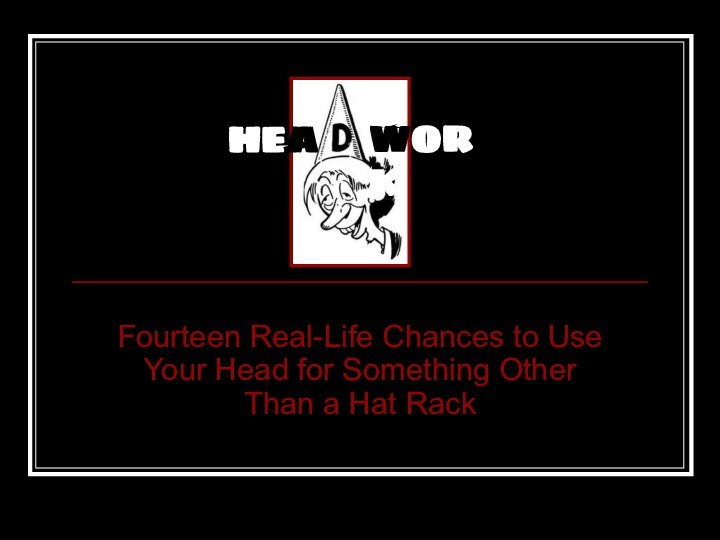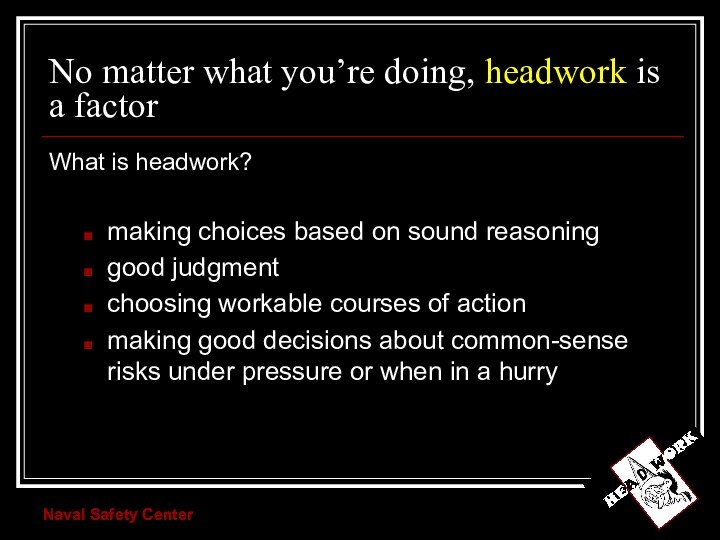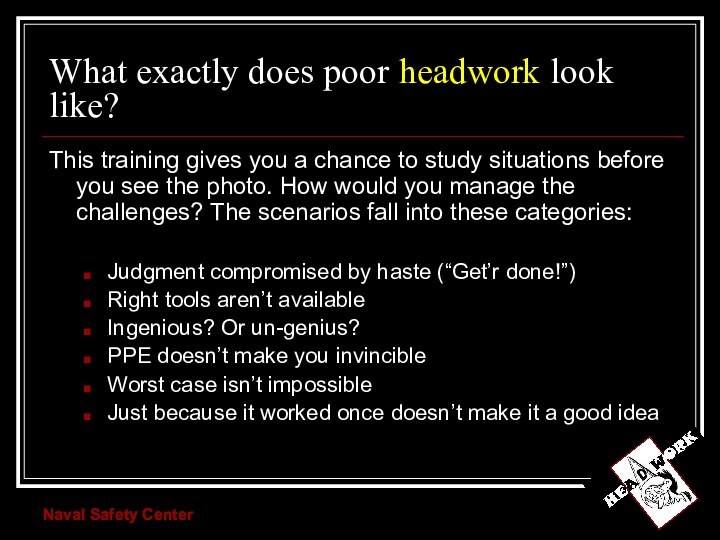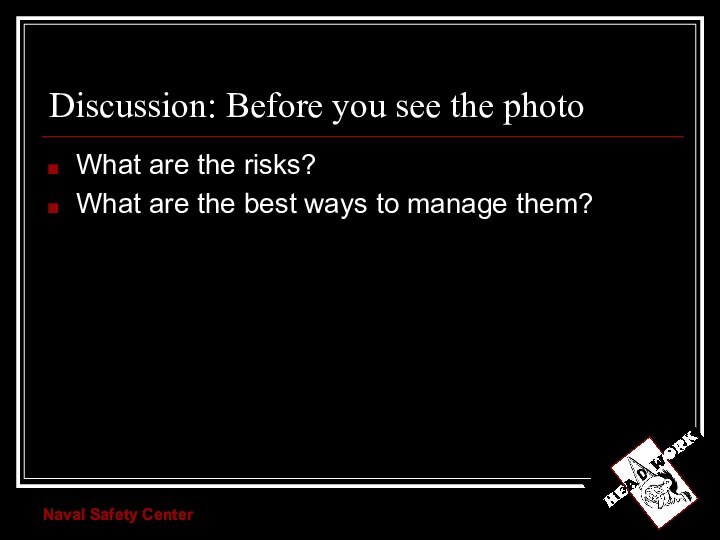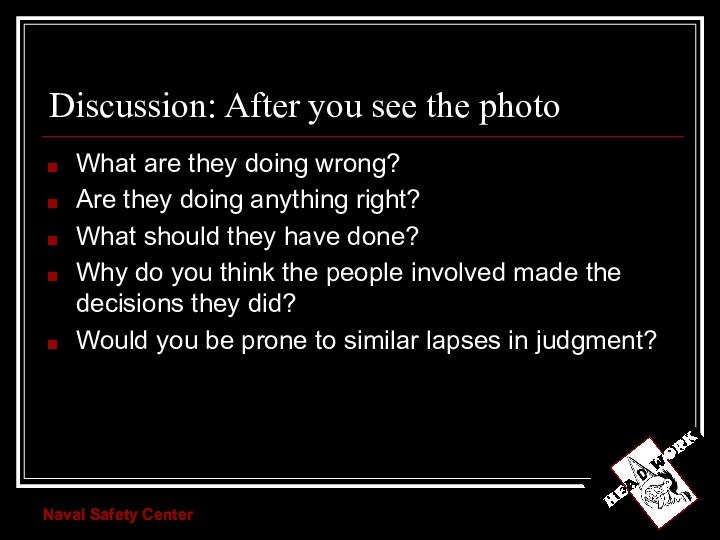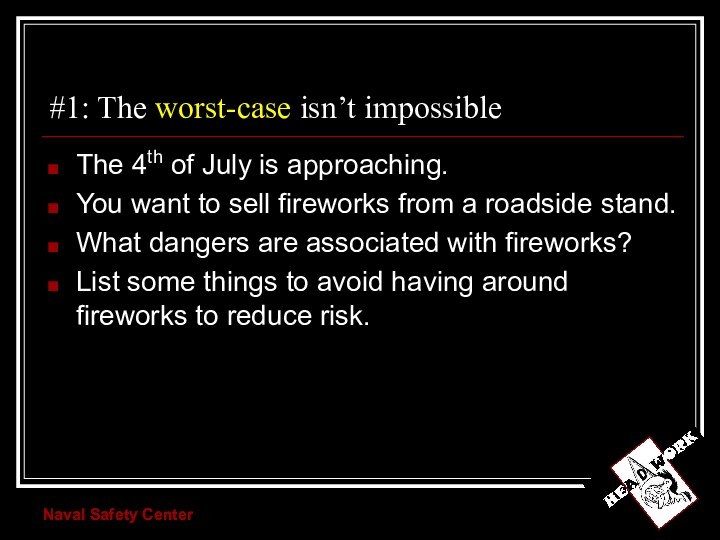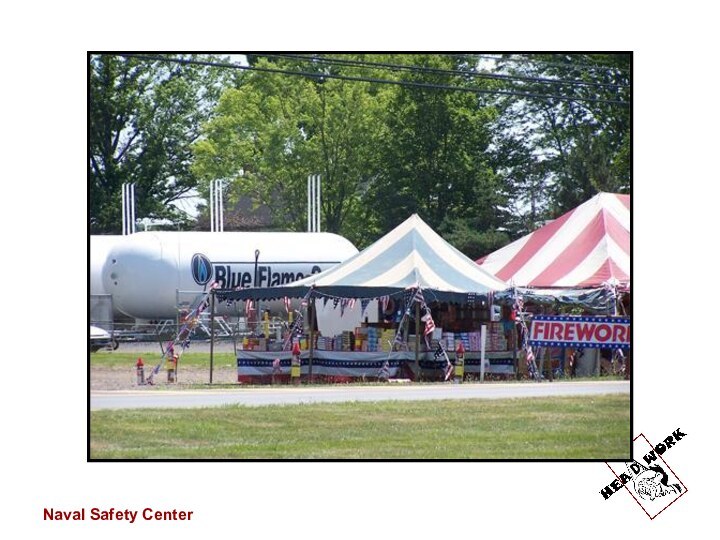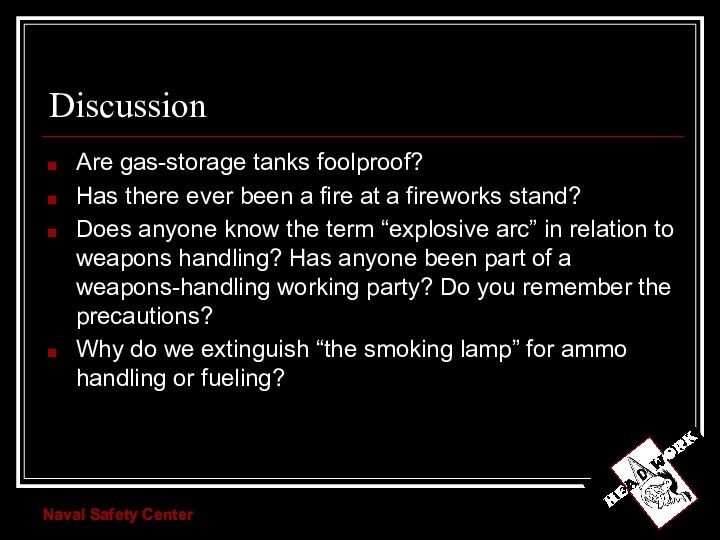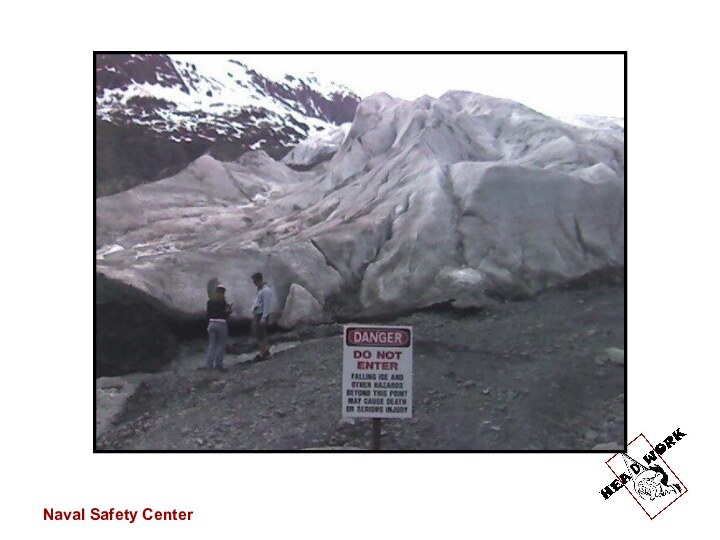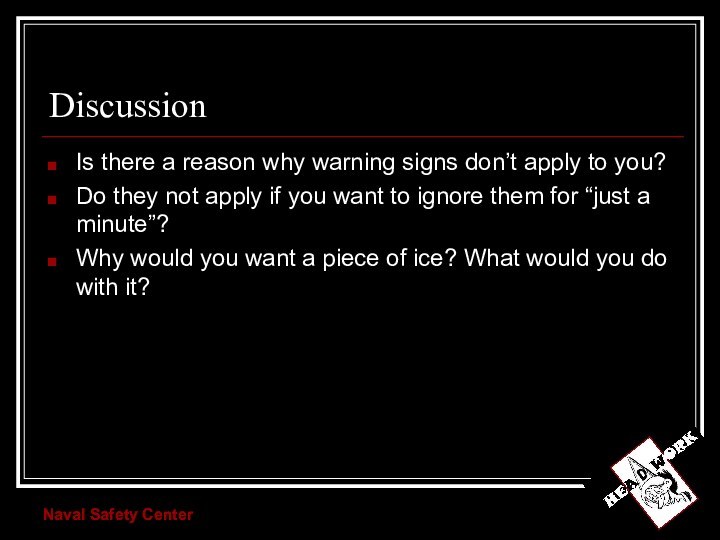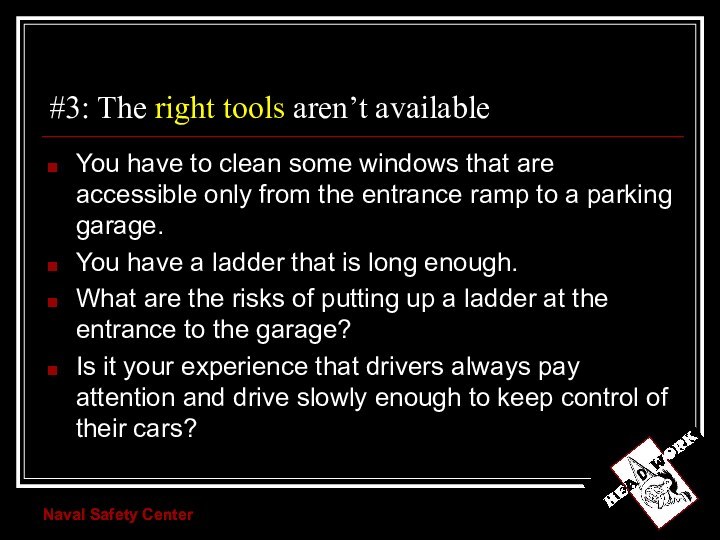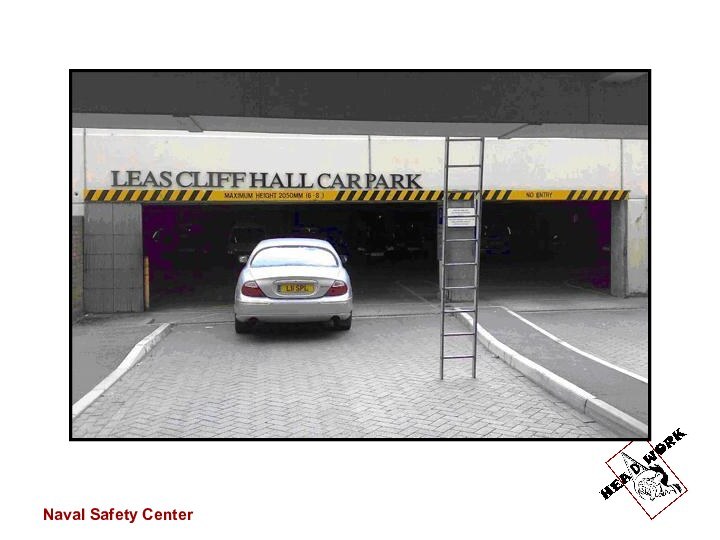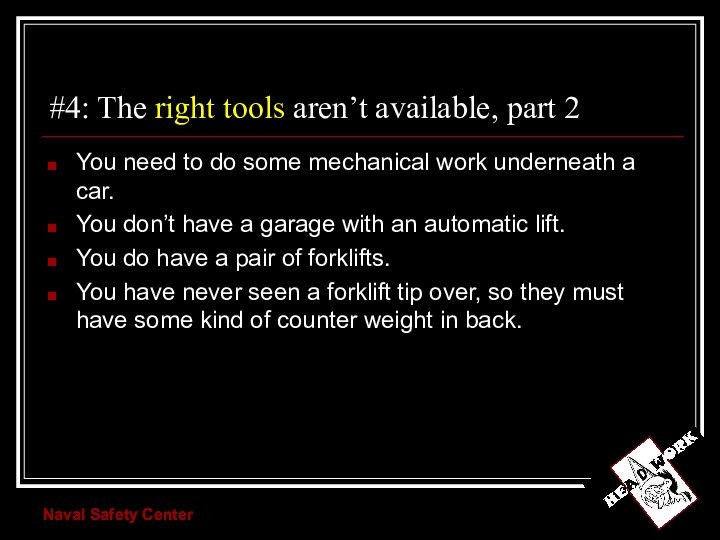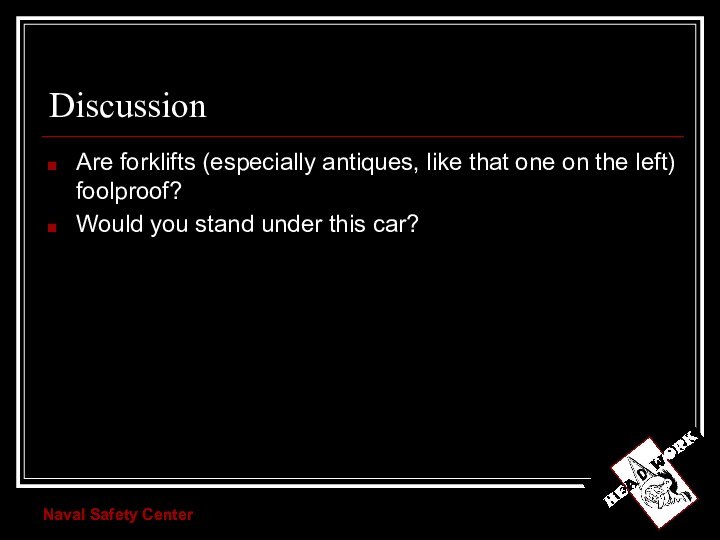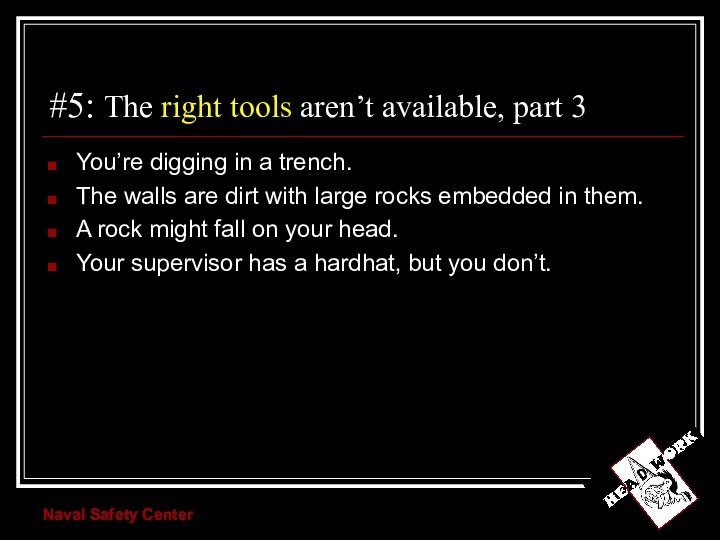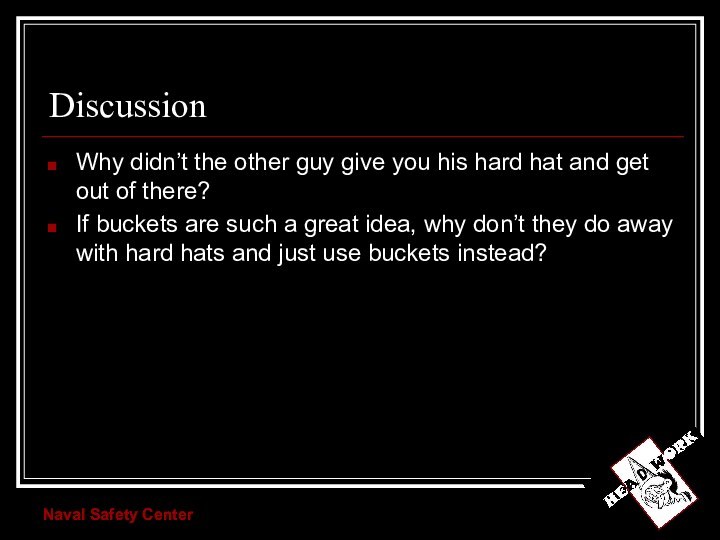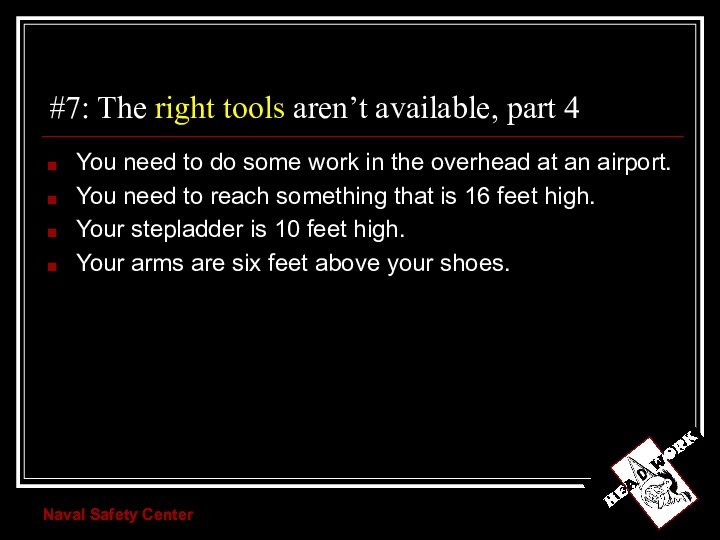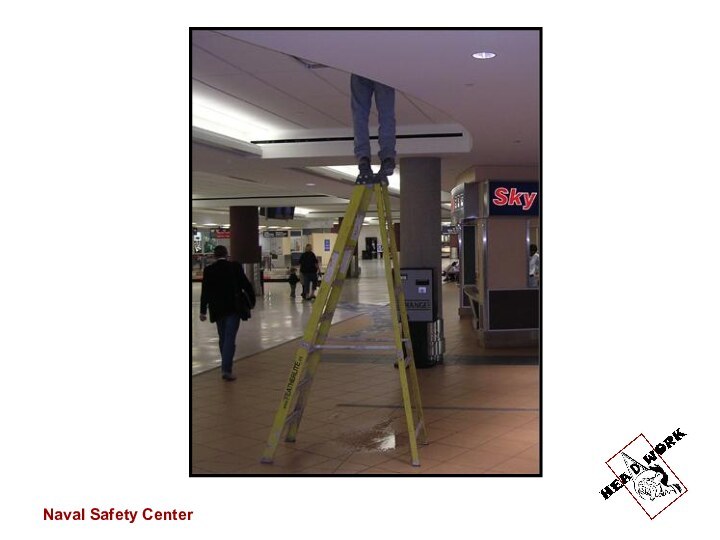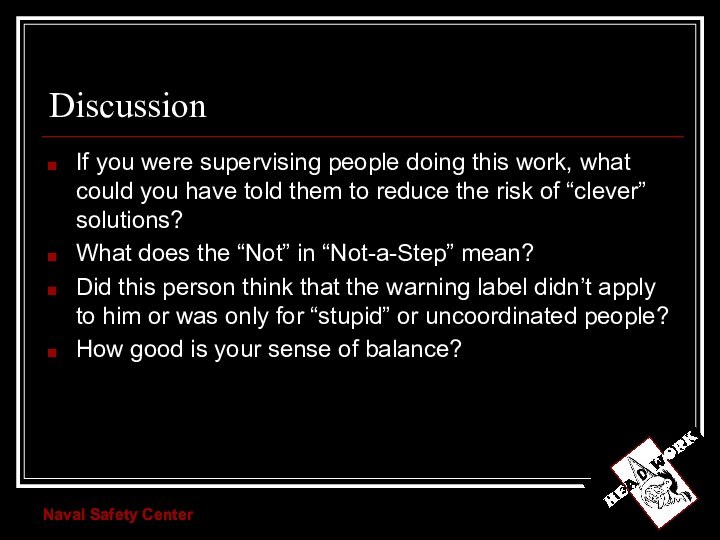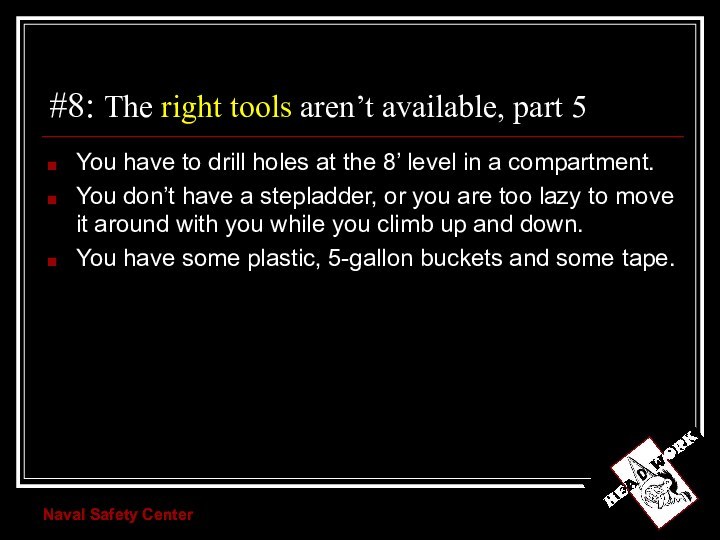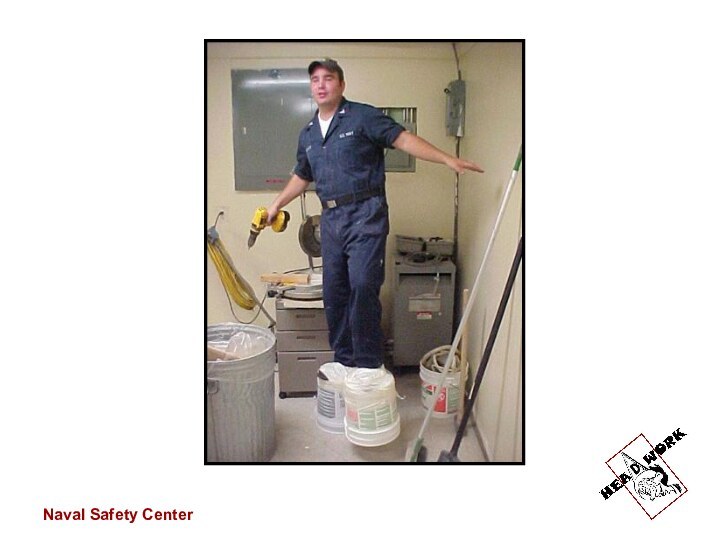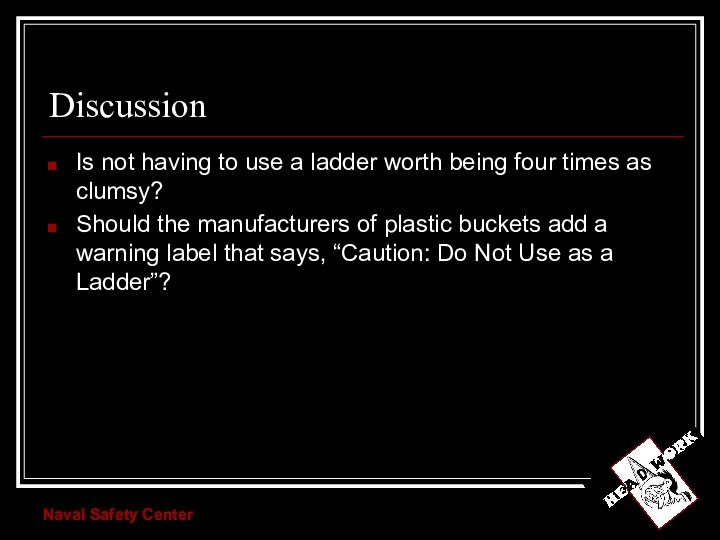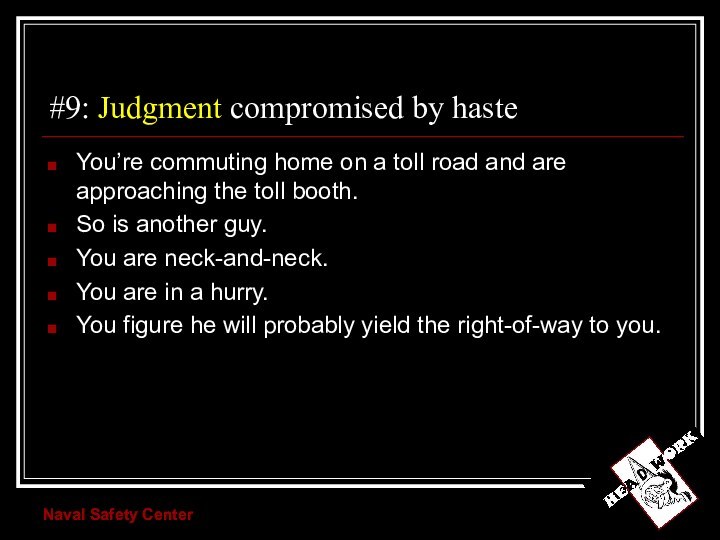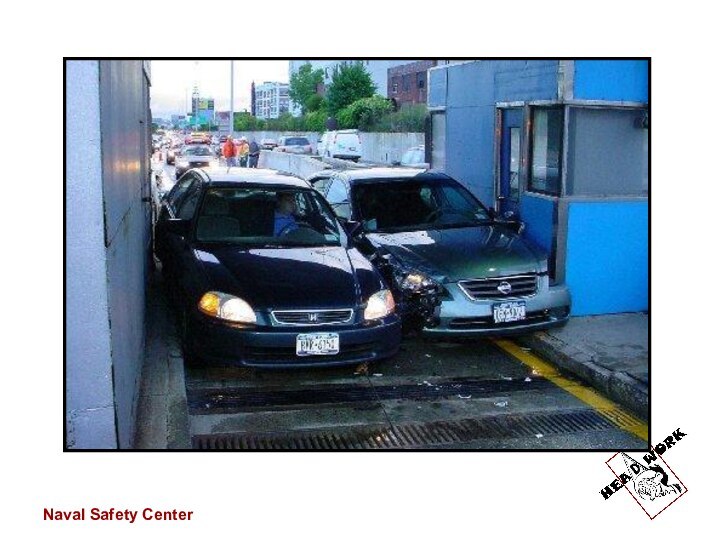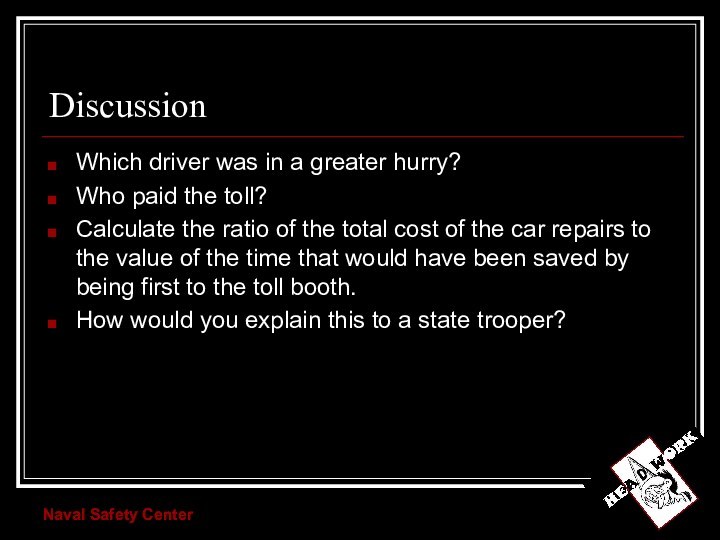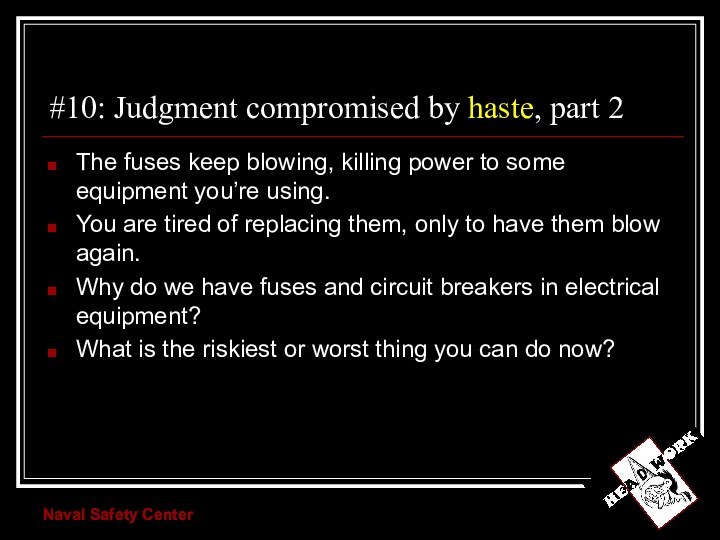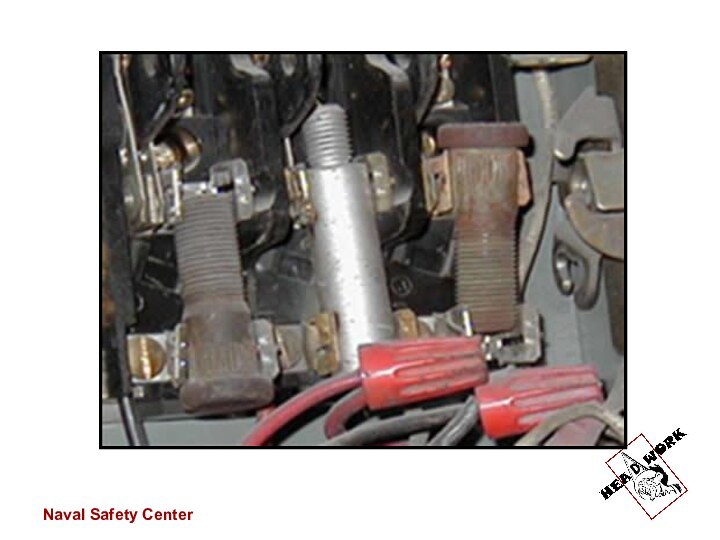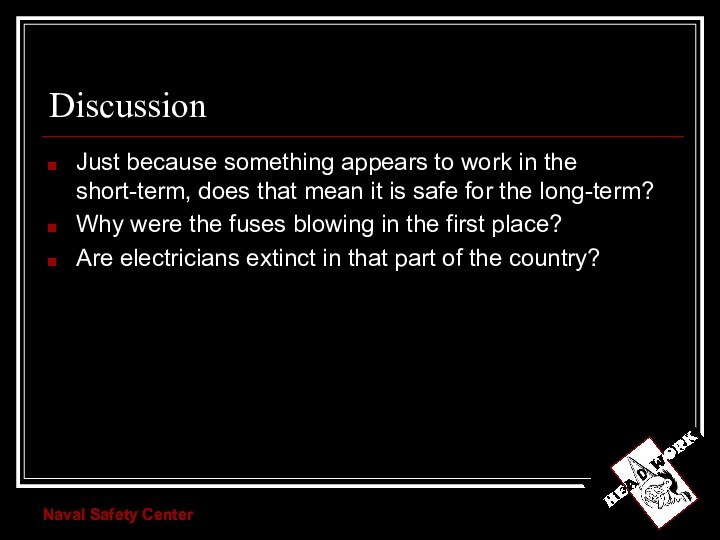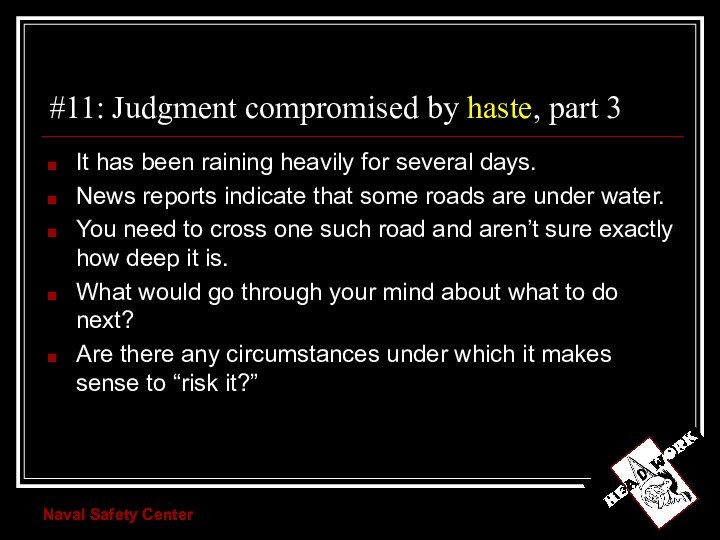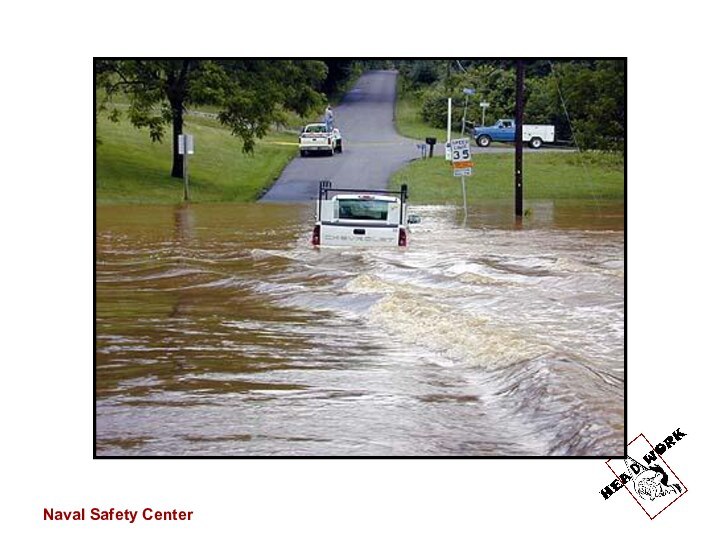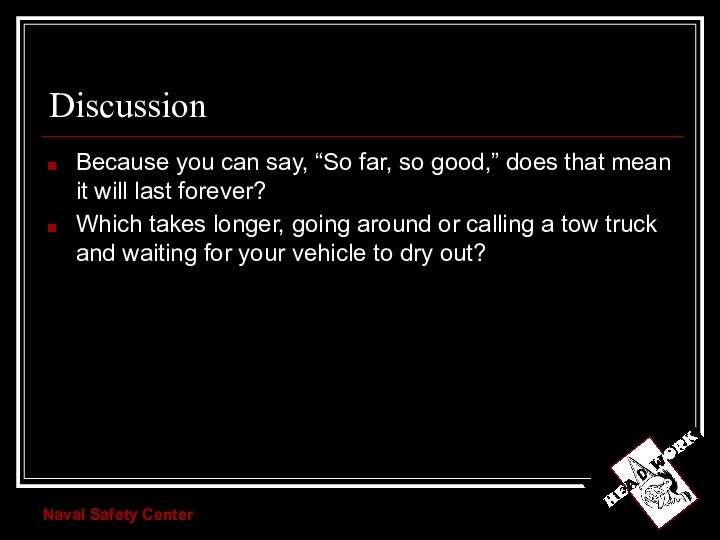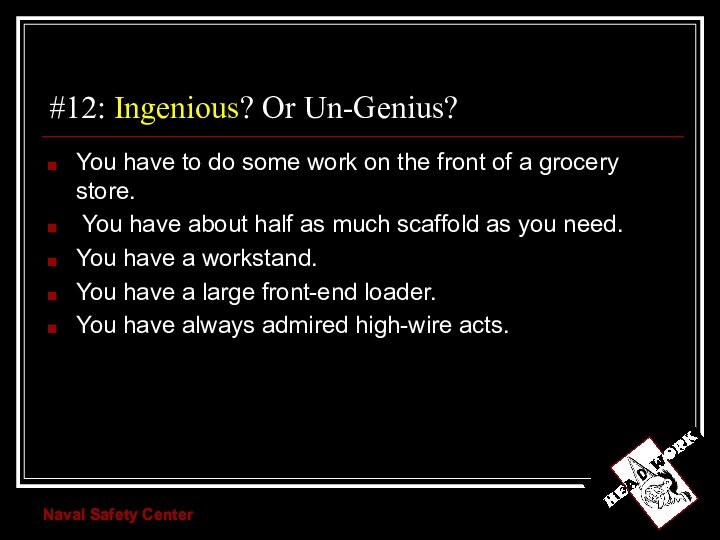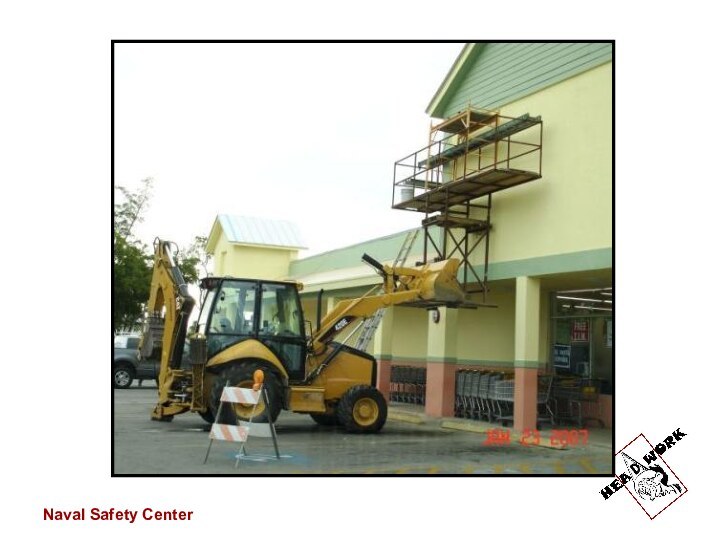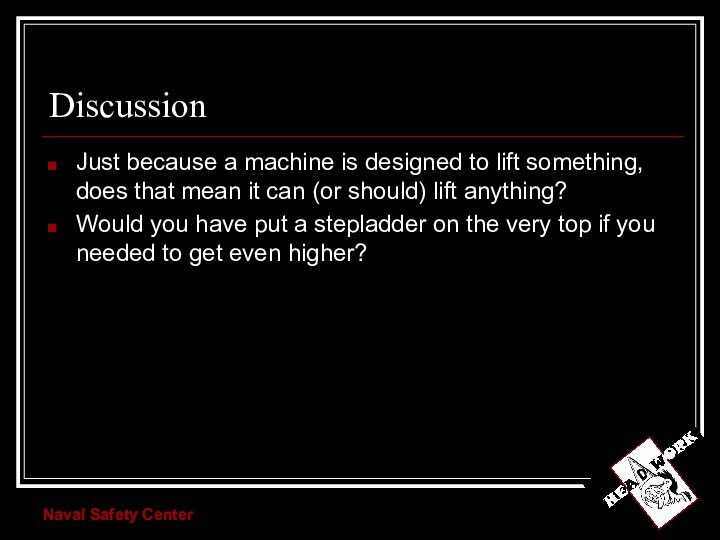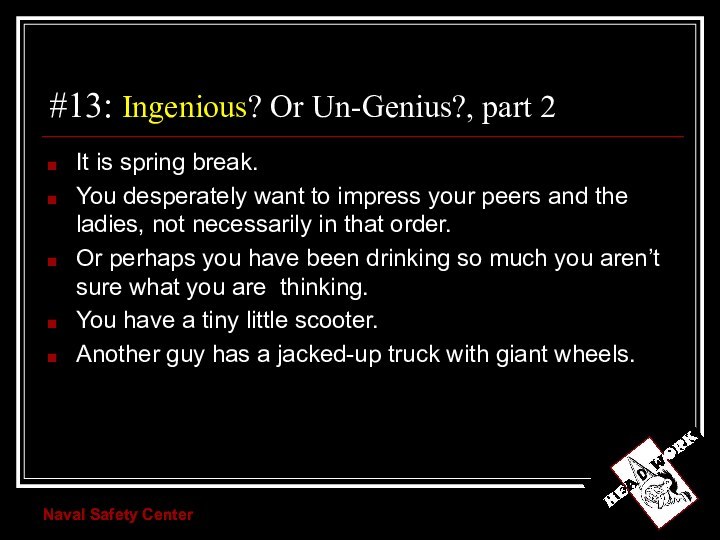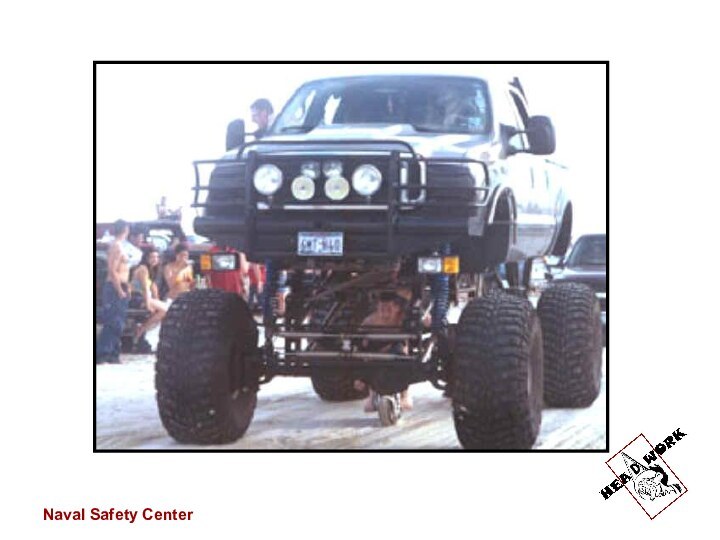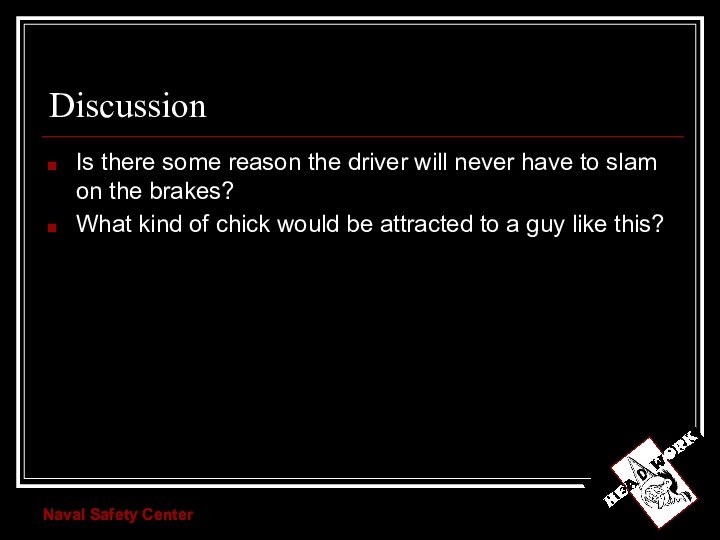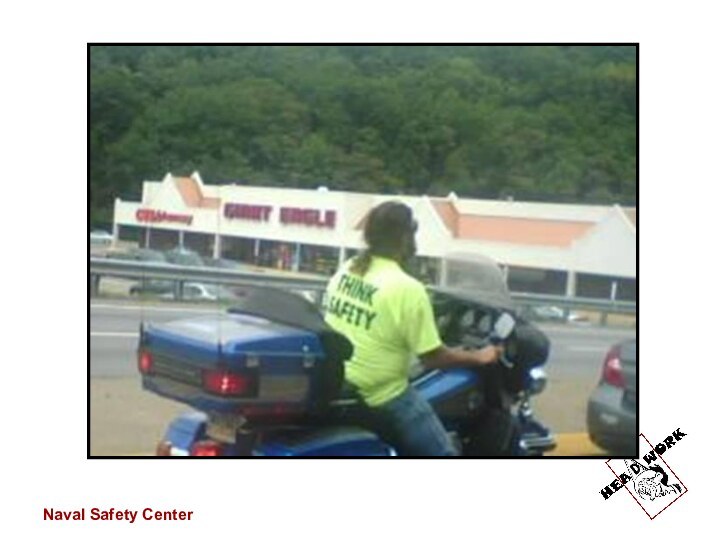Слайд 2
No matter what you’re doing, headwork is a
factor
What is headwork?
making choices based on sound reasoning
good judgment
choosing
workable courses of action
making good decisions about common-sense risks under pressure or when in a hurry
Слайд 3
What exactly does poor headwork look like?
This training
gives you a chance to study situations before you
see the photo. How would you manage the challenges? The scenarios fall into these categories:
Judgment compromised by haste (“Get’r done!”)
Right tools aren’t available
Ingenious? Or un-genius?
PPE doesn’t make you invincible
Worst case isn’t impossible
Just because it worked once doesn’t make it a good idea
Слайд 4
Discussion: Before you see the photo
What are the
risks?
What are the best ways to manage them?
Слайд 5
Discussion: After you see the photo
What are they
doing wrong?
Are they doing anything right?
What should they have
done?
Why do you think the people involved made the decisions they did?
Would you be prone to similar lapses in judgment?
Слайд 6
#1: The worst-case isn’t impossible
The 4th of July
is approaching.
You want to sell fireworks from a roadside
stand.
What dangers are associated with fireworks?
List some things to avoid having around fireworks to reduce risk.
Слайд 8
Discussion
Are gas-storage tanks foolproof?
Has there ever been a
fire at a fireworks stand?
Does anyone know the term
“explosive arc” in relation to weapons handling? Has anyone been part of a weapons-handling working party? Do you remember the precautions?
Why do we extinguish “the smoking lamp” for ammo handling or fueling?
Слайд 9
#2: The worst-case isn’t impossible, part 2
You’re on
vacation at a glacier.
You want a piece of ice
as a souvenir (assuming it would look different or better than a regular piece of ice available at your motel)
A warning sign says, “Do not enter” and some other stuff that you may or may not bother to read.
What are the risks of walking up to a glacier?
Слайд 11
Discussion
Is there a reason why warning signs don’t
apply to you?
Do they not apply if you want
to ignore them for “just a minute”?
Why would you want a piece of ice? What would you do with it?
Слайд 12
#3: The right tools aren’t available
You have to
clean some windows that are accessible only from the
entrance ramp to a parking garage.
You have a ladder that is long enough.
What are the risks of putting up a ladder at the entrance to the garage?
Is it your experience that drivers always pay attention and drive slowly enough to keep control of their cars?
Слайд 14
Discussion
Would you stake your life on this by
climbing up that ladder?
Have you ever noticed all the
black marks and paint scratched off the concrete poles that protect the pumps at gas stations?
Could the workers involved have made better decisions?
Why did they choose not to do so?
How hard is it to find some of those little orange cones or, better yet, station someone to guide traffic?
Слайд 15
#4: The right tools aren’t available, part 2
You
need to do some mechanical work underneath a car.
You
don’t have a garage with an automatic lift.
You do have a pair of forklifts.
You have never seen a forklift tip over, so they must have some kind of counter weight in back.
Слайд 17
Discussion
Are forklifts (especially antiques, like that one on
the left) foolproof?
Would you stand under this car?
Слайд 18
#5: The right tools aren’t available, part 3
You’re
digging in a trench.
The walls are dirt with large
rocks embedded in them.
A rock might fall on your head.
Your supervisor has a hardhat, but you don’t.
Слайд 20
Discussion
Why didn’t the other guy give you his
hard hat and get out of there?
If buckets are
such a great idea, why don’t they do away with hard hats and just use buckets instead?
Слайд 21
#7: The right tools aren’t available, part 4
You
need to do some work in the overhead at
an airport.
You need to reach something that is 16 feet high.
Your stepladder is 10 feet high.
Your arms are six feet above your shoes.
Слайд 23
Discussion
If you were supervising people doing this work,
what could you have told them to reduce the
risk of “clever” solutions?
What does the “Not” in “Not-a-Step” mean?
Did this person think that the warning label didn’t apply to him or was only for “stupid” or uncoordinated people?
How good is your sense of balance?
Слайд 24
#8: The right tools aren’t available, part 5
You
have to drill holes at the 8’ level in
a compartment.
You don’t have a stepladder, or you are too lazy to move it around with you while you climb up and down.
You have some plastic, 5-gallon buckets and some tape.
Слайд 26
Discussion
Is not having to use a ladder worth
being four times as clumsy?
Should the manufacturers of plastic
buckets add a warning label that says, “Caution: Do Not Use as a Ladder”?
Слайд 27
#9: Judgment compromised by haste
You’re commuting home on
a toll road and are approaching the toll booth.
So
is another guy.
You are neck-and-neck.
You are in a hurry.
You figure he will probably yield the right-of-way to you.
Слайд 29
Discussion
Which driver was in a greater hurry?
Who paid
the toll?
Calculate the ratio of the total cost of
the car repairs to the value of the time that would have been saved by being first to the toll booth.
How would you explain this to a state trooper?
Слайд 30
#10: Judgment compromised by haste, part 2
The fuses
keep blowing, killing power to some equipment you’re using.
You
are tired of replacing them, only to have them blow again.
Why do we have fuses and circuit breakers in electrical equipment?
What is the riskiest or worst thing you can do now?
Слайд 32
Discussion
Just because something appears to work in the
short-term, does that mean it is safe for the
long-term?
Why were the fuses blowing in the first place?
Are electricians extinct in that part of the country?
Слайд 33
#11: Judgment compromised by haste, part 3
It has
been raining heavily for several days.
News reports indicate that
some roads are under water.
You need to cross one such road and aren’t sure exactly how deep it is.
What would go through your mind about what to do next?
Are there any circumstances under which it makes sense to “risk it?”
Слайд 35
Discussion
Because you can say, “So far, so good,”
does that mean it will last forever?
Which takes longer,
going around or calling a tow truck and waiting for your vehicle to dry out?
Слайд 36
#12: Ingenious? Or Un-Genius?
You have to do
some work on the front of a grocery store.
You have about half as much scaffold as you need.
You have a workstand.
You have a large front-end loader.
You have always admired high-wire acts.
Слайд 38
Discussion
Just because a machine is designed to lift
something, does that mean it can (or should) lift
anything?
Would you have put a stepladder on the very top if you needed to get even higher?
Слайд 39
#13: Ingenious? Or Un-Genius?, part 2
It is spring
break.
You desperately want to impress your peers and the
ladies, not necessarily in that order.
Or perhaps you have been drinking so much you aren’t sure what you are thinking.
You have a tiny little scooter.
Another guy has a jacked-up truck with giant wheels.
Слайд 41
Discussion
Is there some reason the driver will never
have to slam on the brakes?
What kind of chick
would be attracted to a guy like this?
Слайд 42
#14: Just because it worked once doesn’t make
it a good idea
You have a motorcycle.
You have a
t-shirt with an excellent slogan printed on it.
You ride to a store.
What is the quickest way to show people that safety is not on your mind as you ride your motorcycle?
Слайд 44
Discussion
If you “think safety,” wouldn’t you want to
protect the part of your body that does the
thinking?
Is he wearing this t-shirt to be ironic, or does he think “safety” is just for other people who are not as skilled as he is?
Even if he knows what “ironic” means, does it make any sense to illustrate it this way?
